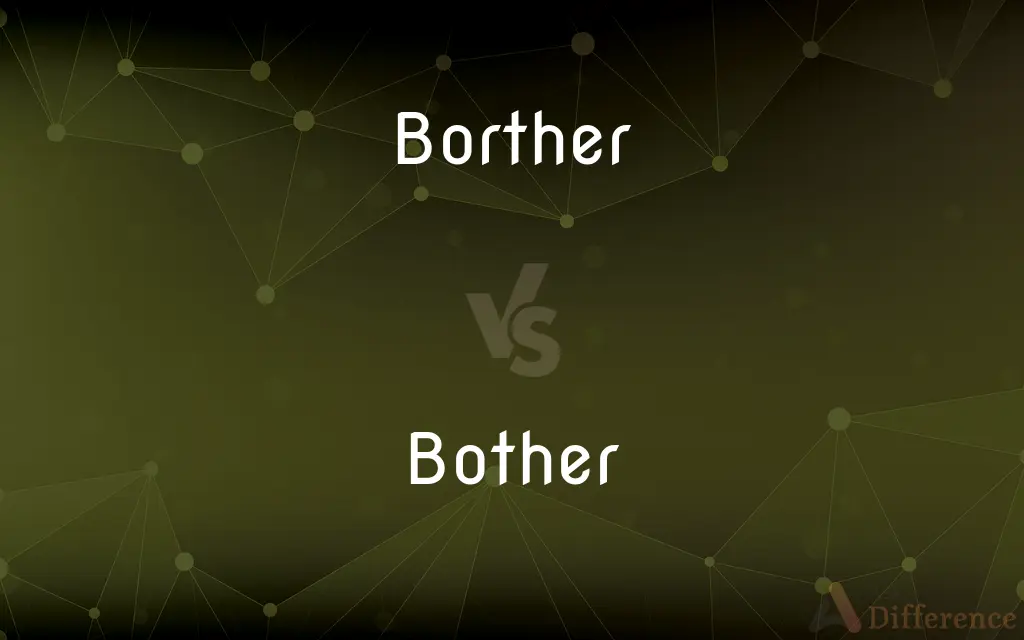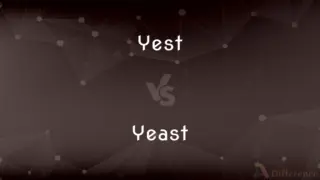Borther vs. Bother — Which is Correct Spelling?
By Tayyaba Rehman — Updated on March 28, 2024
"Borther" is a misspelling, whereas "Bother" is the correct spelling referring to annoyance or disturbance.

Table of Contents
Which is correct: Borther or Bother
How to spell Bother?

Borther
Incorrect Spelling

Bother
Correct Spelling
ADVERTISEMENT
Key Differences
Focus on the fact there's no "r" before the "t" in "Bother".
Remember "Bother" as "Bothered" without the 'ed'.
Relate it to "Both" with an added 'er'.
Visualize someone being disturbed with the phrase "Don't Bother me."
Think of the similar-sounding word "Other" but starting with a 'B'.
ADVERTISEMENT
How Do You Spell Bother Correctly?
Incorrect: He didn't want to borther his teacher with too many questions.
Correct: He didn't want to bother his teacher with too many questions.
Incorrect: The noise from the construction site didn't borther her at all.
Correct: The noise from the construction site didn't bother her at all.
Incorrect: Don't borther asking him for help; he's too busy.
Correct: Don't bother asking him for help; he's too busy.
Bother Definitions
A source of annoyance or inconvenience.
Fixing the leak was such a bother.
To make a fuss or show concern.
He didn't bother to call.
To annoy or disturb someone.
Loud noises always bother him.
To take the trouble to do something.
Why bother going if you're not interested?
To cause to be irritated, especially by repeated acts; trouble or annoy
“I spoke French badly. So I always replied to him in English. This didn't bother him” (Paul Theroux).
To make agitated or perplexed; upset
“Jerry could see … how much the doctor had been bothered by the failure of the first surgery” (Rick Bass).
To intrude on without warrant or invitation; disturb
“When I saw him slumped in a chair, deep in thought, I decided not to bother him” (Pat Toomay).
To give discomfort or pain to
A back condition that bothers her constantly.
To take the trouble (to do something); concern oneself with (accomplishing something)
“Most people [with the syndrome] have such mild symptoms that they never bother to see a doctor” (Jane E. Brody).
To take trouble; concern oneself
“old, hard-to-reach coal seams that were too complex or dangerous for other coal companies to bother with” (Jeff Goodell).
A cause or state of disturbance.
Used to express annoyance or mild irritation.
(transitive) To annoy, to disturb, to irritate.
Would it bother you if I smoked?
(intransitive) To feel care or anxiety; to make or take trouble; to be troublesome.
Why do I even bother to try?
(intransitive) To do something which is of negligible inconvenience.
You didn’t even bother to close the door.
Fuss, ado.
There was a bit of bother at the hairdresser's when they couldn't find my appointment in the book.
Trouble, inconvenience.
Yes, I can do that for you - it's no bother.
A mild expression of annoyance.
To annoy; to trouble; to worry; to perplex. See Pother.
To feel care or anxiety; to make or take trouble; to be troublesome.
Without bothering about it.
One who, or that which, bothers; state of perplexity or annoyance; embarrassment; worry; disturbance; petty trouble; as, to be in a bother.
An angry disturbance;
He didn't want to make a fuss
They had labor trouble
A spot of bother
Something or someone that causes trouble; a source of unhappiness;
Washing dishes was a nuisance before we got a dish washer
A bit of a bother
He's not a friend, he's an infliction
Take the trouble to do something; concern oneself;
He did not trouble to call his mother on her birthday
Don't bother, please
Cause annoyance in; disturb, especially by minor irritations;
Mosquitoes buzzing in my ear really bothers me
It irritates me that she never closes the door after she leaves
To cause inconvenience or discomfort to;
Sorry to trouble you, but...
Intrude or enter uninvited;
Don't bother the professor while she is grading term papers
Make nervous or agitated;
The mere thought of her bothered him and made his heart beat faster
Make confused or perplexed or puzzled
An emotional state of being disturbed.
It's no bother to help.
Bother Meaning in a Sentence
Why bother going out if you're not going to enjoy yourself?
She didn't bother to lock the door when she left.
Don't bother me while I'm reading.
Why does it bother you so much what other people think?
It bothers me that I can't remember where I left my keys.
The thought of moving didn't bother him in the least.
She asked him not to bother her again.
Does it bother you when people are late?
Why bother with formalities when we're all friends here?
He didn't want to bother his friends with his problems.
The high prices at the restaurant didn't bother them.
It doesn't bother me if you arrive late.
She tried not to let the rude comment bother her.
Don't let small setbacks bother you.
Bother Idioms & Phrases
Bother to do something
Making an effort to do something.
He didn't even bother to call and let us know he'd be late.
Sorry to bother you
A polite way of acknowledging that you might be inconveniencing someone.
Sorry to bother you, but could you help me move this table?
Don't bother
Used to tell someone not to worry about doing something.
Don't bother cooking tonight; we'll order pizza.
Bother someone's head off
To annoy someone greatly.
The constant questions from the students nearly bothered the teacher's head off.
Why bother?
Questioning why one should make an effort when it seems pointless.
Why bother cleaning now if the kids are going to make a mess again?
Bother with
To engage with something that may be annoying or troublesome.
I don't know why you bother with that old car; it's always breaking down.
Too hot to bother
Too uncomfortable to make an effort due to heat.
It was too hot to bother going for a run.
Don't let it bother you
Advice to not allow something to upset or affect you.
Don't let it bother you if someone doesn't like your idea.
Common Curiosities
Why is it called Bother?
The term originates from the early 18th century, potentially from the Irish word "bodhaire" meaning 'noise'.
What is the root word of Bother?
The exact root is uncertain, but it may be from the Irish "bodhaire".
What is the pronunciation of Bother?
/ˈbɑː.ðɚ/.
What is the plural form of Bother?
Bothers.
Which preposition is used with Bother?
"With" as in "bothered with a problem."
Which conjunction is used with Bother?
The use of conjunctions isn't specific to "bother."
What is the verb form of Bother?
Bother (as in "Don't bother me").
Is Bother an abstract noun?
Yes, when referring to the state of annoyance.
Which vowel is used before Bother?
The vowel "a" can precede it, as in "a bother."
What is the singular form of Bother?
Bother.
Which article is used with Bother?
"The" or "a" depending on the context.
Is Bother an adverb?
No.
Is Bother a negative or positive word?
Typically negative.
Is Bother a vowel or consonant?
It's a word containing both vowels and consonants.
Is the word Bother a gerund?
No.
Is Bother a noun or adjective?
It can be a noun or a verb, but not an adjective.
Is the word Bother imperative?
It can be, as in "Don't bother!"
What is a stressed syllable in Bother?
"Both."
How many syllables are in Bother?
Two.
What is another term for Bother?
Annoy.
Which determiner is used with Bother?
"This" or "that" can be used, depending on context.
What is the first form of Bother?
Bother.
What is the third form of Bother?
Bothered.
How is Bother used in a sentence?
"It didn't bother her that the room was messy."
Is Bother a countable noun?
Yes, when referring to specific instances (e.g., many bothers).
Is Bother a collective noun?
No.
What is the opposite of Bother?
Comfort.
Is the Bother term a metaphor?
Not inherently, but can be used metaphorically.
Is the word “Bother” a Direct object or an Indirect object?
It can serve as a direct object, e.g., "She didn't want the bother."
How do we divide Bother into syllables?
Both-er.
What part of speech is Bother?
It can be a verb or a noun.
What is the second form of Bother?
Bothered.
Share Your Discovery

Previous Comparison
Yest vs. Yeast
Next Comparison
Ofer vs. OfferAuthor Spotlight
Written by
Tayyaba RehmanTayyaba Rehman is a distinguished writer, currently serving as a primary contributor to askdifference.com. As a researcher in semantics and etymology, Tayyaba's passion for the complexity of languages and their distinctions has found a perfect home on the platform. Tayyaba delves into the intricacies of language, distinguishing between commonly confused words and phrases, thereby providing clarity for readers worldwide.













































